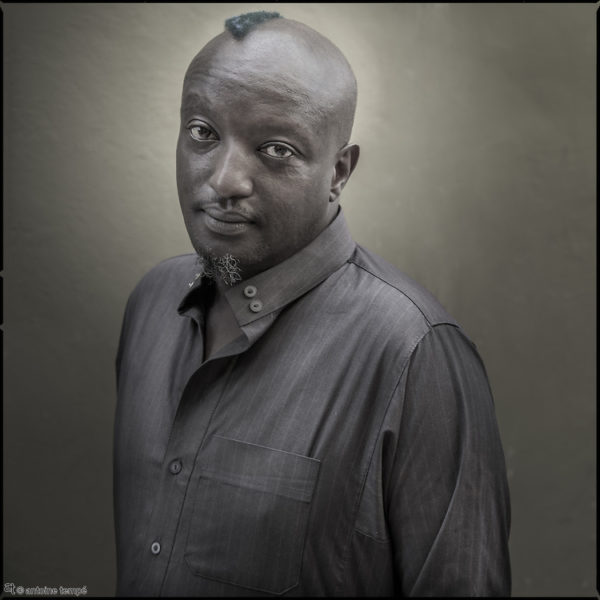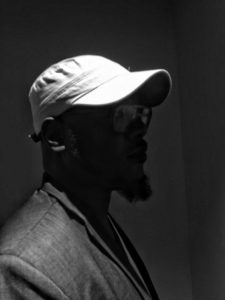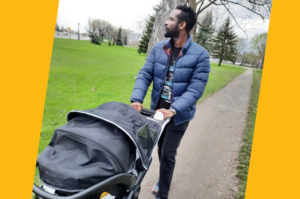
THERE ARE A number of things I have said frequently:
—“Discovering Home” is the best-written short story to win the Caine Prize.
—Why didn’t Nigerian writers care about prose the way Binyavanga did?
—If established Nigerian writers behaved with younger writers the way Binyavanga did, our problems would be significantly reduced.
I might have told the late great Kenyan writer the first thing. I never told him the last two.
LONG BEFORE I met Binyavanga Wainaina at the Farafina Trust Creative Writing Workshop in Lagos, I had met him. On paper, that is. A friend emailed me “Discovering Home.” I had it printed and went over its sentences the way one might trace a tongue over a cone of ice-cream. I recall my excitement at one of its opening sentences: “Somebody has locked themselves in the toilet.” Something about the brevity of the sentence and that strange pact between those pronouns—somebody, themselves—had me hooked. I befriended him on Facebook.
One day, I came upon a post by him on the platform. He was making a show of burning his Internet device. He wrote about it. That rant was the most artful thing I had ever read on Facebook. It was crazy, it was dishevelled, it was funny—how the hell had he made it artful? I liked to tease my friends from Kenya about their prose being too focused on birds and trees, how they all seemed to reach for whimsy. The Binj was different. His prose was muscular but melodious. I respected it. I loved it. It was the reason I was disappointed when I met him at the Workshop.
When I learned Binyavanga Wainaina would be at the workshop, I was determined to learn the secret behind composing a piece of writing the way he did. Perhaps he could tell me where to put this word and then this other word and how to open and close a piece of writing memorably.
But no, he seemed more invested in politics than prose. He would go on a tangent and never return to whatever the original point he was making was. I wanted to behold his gods and make them love me but he wouldn’t let me peer at them. For more than a week, his gods remained undisclosed. He took it for granted that the room was full of decent writers, that what he needed to do was to let them show their gifts, give them a chance at thinking their own thoughts and telling their own stories.
At the time I was frustrated. I came for secrets; he was giving me a show. Deep in my own youthful conceit, I would have loved to be called aside and given the key points to writing well. That never happened—until I realised that I could take the initiative.
After Chimamanda Ngozi Adichie, who headed the Workshop, Binj was perhaps the biggest of his generation’s literary masquerades, and yet he proved very accessible. He wasn’t going to tell me how to set down sentences, so I sent a message asking if he could introduce me to the guys at Chimurenga. He agreed, saying I should send him an email. “Okay sir,” I wrote.
“DO not call me SIR!” he replied. “My name is Binyavanga or Binj. . . U Nigerians and your ogas!”
Point taken.
I later found an email from him on the subject, and the next time an edition of the journal came out, I had a piece in it. I’d written about the Workshop.
IT WASN’T the last time the Binj was nice to a young writer who had absolutely no way of paying him back. Except, of course, he knew I’d write a tribute to him upon his passing, but how could he have known that when he was supposed to be immortal? He had an appetite for life that was all too apparent. And life loved him, too. He only had to speak for you to see just how much he was enjoying a life of thinking, talking, writing.
In the years following that workshop, we met a few times. Things hardly changed between us—he was interested still in my writing, if I had any projects going on—but he had changed. He suffered a stroke and it was painful watching him find a way to say words he was thinking at the pace of his thoughts. And yet he remained fun to be around.
THE LAST time I saw him, Binj was a fellow at the DAAD programme in Berlin, and I had just finished at a residency in northern Germany. He, too, had been at the same residency and left not long before I showed up. I asked how he had been. Apparently, he liked to ride a bike, and his outspokenness, on racism especially, wasn’t much appreciated by everyone there.
In the weeks preceding our meeting in Germany, I read his social media posts and began to believe he was not doing so well. I sent him a message asking if he was in Berlin. He responded with his phone number. “Get in touch,” he wrote.
I took a train from Westerland to Hamburg, from where I was to fly to Lagos, dropped my luggage at a friend’s place, and got a ride to Berlin. As I walked from the subway station not far from his Charlottenburg apartment, I composed consolatory phrases in my head, convinced that I would meet a decrepit man mumbling curses in his personal library.
There was no need. At the door, a surprisingly fit Binj said hi. He looked nothing like his online posts. Even as he was yet to recover fully from the stroke, he looked great. I adjusted; he could have been the one to console me. He brought us beers and we sat and talked and talked. He was proud of the massive artwork on his wall. It was made of artfully arranged nails on a black canvas. He spoke of taking it with him to South Africa, where he planned to relocate to, and I recall wondering just how much money he would pay for that to be done; the piece itself had been quite pricey. I think it was part of his magic that money never seemed to be an issue—perhaps that was another source of his appeal: we knew he was great but how was he monetising this greatness? Everybody else was either a stay-at-home great or producing books per second or winning hefty sums of prize money or trading off their prose for corporate copy. Binj seemed to float and fly on prose and goodwill. How did he do it? A literary biography might help anyone interested understand his peculiar sleight-of-cash.
In any case, someone once told me that young male African writers idolise Binj too much. I think this means we wrote about him too much or quoted him frequently. I am certainly guilty of the accusation, and a bit of that comment was perhaps about patriarchy. That may be so, but when I remember the ease of our conversation that evening in Berlin even after all that time apart, and my own gratitude that prose like his was written by a person from this continent, I think of our idolatry as inevitable.
His death at 48, way too soon, has made the world a sadder place. When I read the many tributes from people young and old, female and male, African and non, I am glad to know I am not alone in thinking highly of a great prose stylist, a fiercely original thinker, and an incredibly generous man.
May The Binj rest in peace. He has earned it.
About the Writer
 Oris Aigbokhaevbolo, writer, essayist, and critic, is the founder of the Write With Style workshop. His collection of essays on Nigerian pop culture—Nollywood, Naija pop, and Nigerian writing—is forthcoming.
Oris Aigbokhaevbolo, writer, essayist, and critic, is the founder of the Write With Style workshop. His collection of essays on Nigerian pop culture—Nollywood, Naija pop, and Nigerian writing—is forthcoming.









John Stewart May 30, 2019 09:17
Thanks Oris for this beautiful tribute. How the Binj would have laughed at being idolised. but he loved being adored.